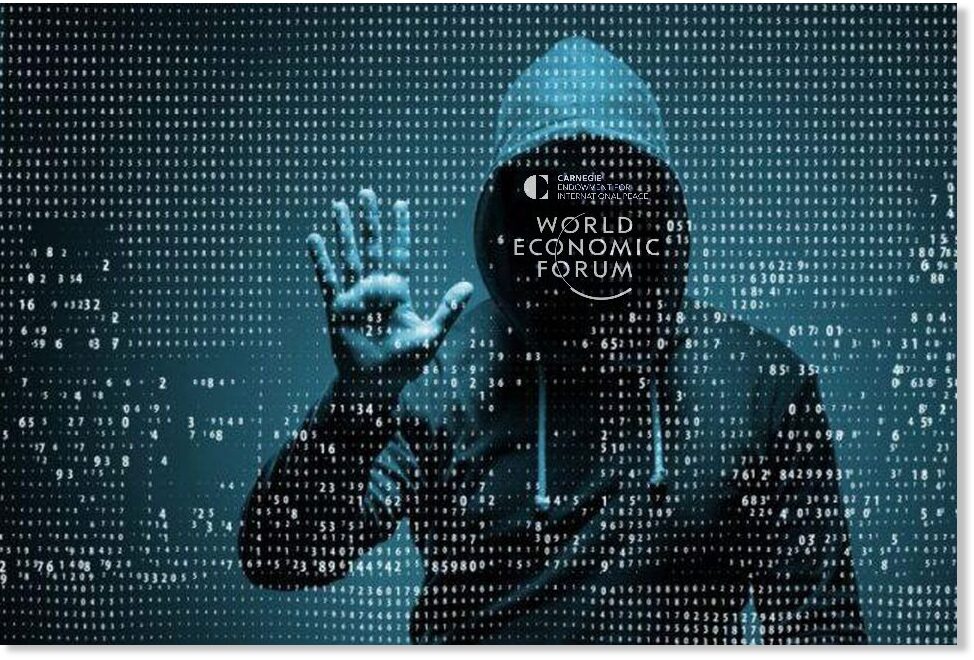Another excellent bit of dot-connecting by Whitney Webb on the likelihood of a false flag cyber attack on the banking system and what it will help usher in:

World Economic Forum warns of cyber attack leading to systemic collapse of the global financial system
A report published last year by the WEF-Carnegie Cyber Policy Initiative calls for the merging of Wall Street banks, their regulators and intelligence agencies as necessary to confront an allegedly imminent cyber attack that will collapse the...www.sott.net
"The COVID-19 crisis has since been cited as the main justification for accelerating the "digital transformation" of the financial and other sectors that the Forum and its partners have promoted for years. Their latest prediction of a doomsday event, a cyber attack that stops the current financial system in its tracks and instigates its systemic collapse, would offer the final yet necessary step for the Forum's desired outcome of this widespread shift to digital currency and increased global governance of the international economy.
Given that experts have been warning since the last global financial crisis that the collapse of the entire system was inevitable due to central bank mismanagement and rampant Wall Street corruption, a cyber attack would also provide the perfect scenario for dismantling the current, failing system as it would absolve central banks and corrupt financial institutions of any responsibility. It would also provide a justification for incredibly troubling policies promoted by the WEF-Carnegie report, such as a greater fusion of intelligence agencies and banks in order to better "protect" critical financial infrastructure."
Set the calendar for July on this one. They're already gaming it:

From "Event 201" to "Cyber Polygon": The WEF's Simulation of a Coming "Cyber Pandemic"
Last year, the World Economic Forum teamed up with the Russian government and global banks to run a high-profile cyberattack simulation that targeted the financial industry, an actual event that would pave the way for a "reset" of the global...
On Wednesday, the World Economic Forum (WEF), along with Russia's Sberbank and its cybersecurity subsidiary BI.ZONE announced that a new global cyberattack simulation would take place this coming July to instruct participants in "developing secure ecosystems" by simulating a supply-chain cyberattack similar to the recent SolarWinds hack that would "assess the cyber resilience" of the exercise's participants. On the newly updated event website, the simulation, called Cyber Polygon 2021, ominously warns that, given the digitalization trends largely spurred by the COVID-19 crisis, "a single vulnerable link is enough to bring down the entire system, just like the domino effect," adding that "a secure approach to digital development today will determine the future of humanity for decades to come."
Who knows how soon the real event will follow on the heels of their rehearsal.
Another thing to try to wrap my brain around is that this is a global rehearsal. Who knows if it will be unleashed all at once everywhere, or if it will be seeded in certain nations sporadically so as to drum up public fear of 'infection' of domestic systems... Syria? Russia? Iran? China? Or even the USA? Either way, it seems that the plan is indeed, a global controlled demolition.
Given that the Belt and Road Initiative seems to be the only Other Option to the Great Reset Agenda, it will be incredible to see how the BRI nations fare during this potential upcoming storm.
Another aspect to think about is the effect on crypto currencies. From Catherine Austin-Fitts:
Former Assistant Secretary of Housing and investment advisor Catherine Austin Fitts says you have to be careful and fully understand Bitcoin. Fitts explains, “We do know they want to go to an all-digital system with central bank cryptos. The easiest way to build the prison is to get freedom lovers everywhere to build the prison for you. To me, Bitcoin has always been the prototype on the way to building the all-digital crypto system that they would love to put into place. You have $400 trillion in fiat (currency) and it needs a place to go. If you are trying to buy up all the gold, silver and farmland, the last thing you need is competition from retail. They want to shift them into crypto and get them to build the crypto train tracks. In a funny kind of way, it’s brilliant.
There is talk by big banks that Bitcoin could go to $300,000 per unit by the end of the year. Fitts thinks, “This is absolutely possible. This is pure politics. This has nothing to do with economics. How much will the central bankers, who can print as much money as they want, spend to get you into this platform? Your guess is as good as mine. The sky’s the limit as to how much they can spend. Remember, once they decide to bring out the central bank currencies, and they have steadily been regulating the crypto currencies, Bitcoin and everything else, so the day they decide to take this to zero, they can do it. If you are going to invest into cryptos and build our prison for us, what you need to know is this thing could go to $300,000, and it can also go to zero. This is a highly speculative market, and you need to approach it accordingly.”
So it could be that bitcoin is some kind of bait specific to crypto enthusiasts, luring them in, drumming up their confidence, generating returns, getting all their eggs in one basket - then the cyber attack hits, and somehow their value is all wiped out, giving them no chance but to sign their life away with a centralized bank digital currency, and all that that entails.
